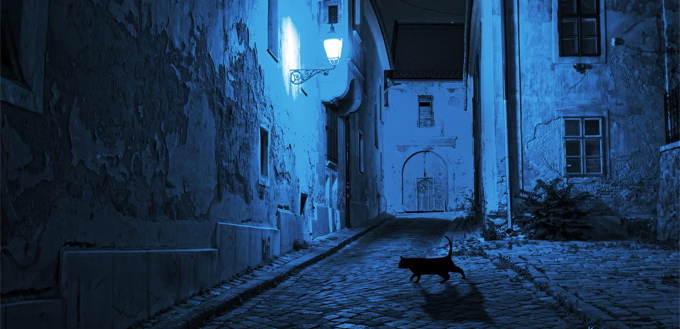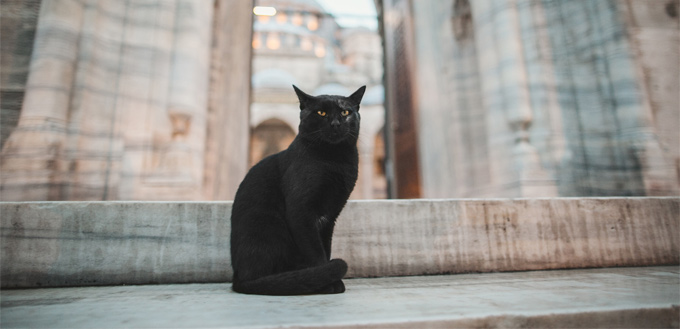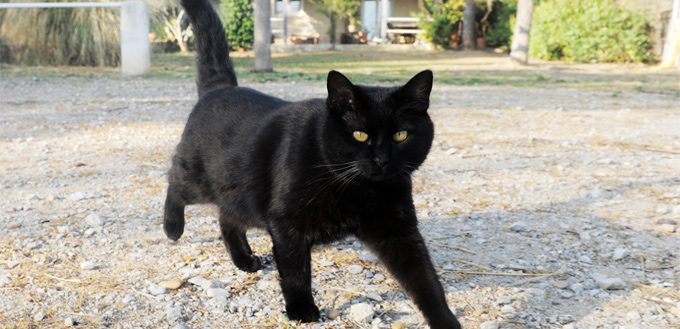It’s no secret that the world is still feeling the after-effects of a superstition dating back to the time of witch-hunting and fanaticism. Yet why, in our modern-day society, with all our advances and scientific knowledge, do we still feel the need to associate the iconic black cat with both positive and negative prejudices? By taking a look at our history with these dark, purr-y beings, we hope to help open up a conversation about what it means to be superstitious- and what are these superstitions, anyway?
History of the Black Cat
While the majority of black cats we see in our day-to-day lives are mixed breeds there are, in fact, 22 specific breeds that are recognized by the CFA (Cat Fancier’s Association) including the Bombay, Oriental and the Sphynx. The black fur itself is caused by a gene that suppresses the tabby markings that are common in domestic cats- you can sometimes see the very slight markings in the fur, usually when your black cat is sunning itself nearby.

One of the most iconic moments in cat history is the Egyptian reverence of the cat. It is well-documented that cats in Ancient Egypt were black and the people considered them to be the embodiment of the Gods. Similarly, one of the oldest and most well-known Norse Gods, Freyja, was believed to have a carriage which was pulled by black cats. Freyja herself was believed to be the God of sorcery and power, alongside womanhood and feminism. After the cats faithfully served Freyja for seven years, she rewarded them by turning them into witches, free to roam the land. This would later make our black cat’s lives a little worse for wear.
The worshipping of cats changed its meaning by the middle-ages and any deity that was not the Christian God was seen to be the equivalent of worshipping an idol- or worse, the devil. It was during this time that witches began to be hunted and, with the hunter’s viewpoint being that witches were serving the Devil.
Meanwhile, cats and their own history began to work against them. Black cats were frequently pictured with those who were deemed witches and therefore vilified and hunted in the same way that innocent women were. The idea that the witches would transform into their cats and try to escape punishment was pushed onto the people and the poor felines suffered for these fallacies. The creatures that were once revered as our connection to a higher power became the very thing that people became most afraid of.
Of course, other factors played a part in the myths surrounding cats, including the black plague. While we now know that it was fleas who caused the black plague, having been carried on rats across the seas, it was believed at the time that cats were carriers and mass-killing ensued, which inevitably caused more rats to live and therefore caused the plague to worsen.
Luckily not all cultures still view black cats as bringers of misfortune and fear- indeed, there are a number of superstitions regarding black cats that are actually very positive in nature. Below, we consider the best of the good and the bad myths surrounding our furry friends.
Why Are Black Cats Good Luck?
Not all superstitions are negative. In fact, the older the myth, the more likely it is that the story surrounding a black cat is positive. We’ve scoured the internet to bring you some of the most positive superstitions surrounding our mini-panthers.
- In love
If you’re lucky enough to have a black cat sneeze on your wedding day, it is said that your marriage will be happy and successful.
It is said that, in England, if a black cat were to live at a young ladies house, then she would have many suitors and be considered more eligible for marriage.
Fisherman’s wives in the UK believed that owning a black cat would ensure the safe return of their loved ones and provide protection while their husband was at sea. Indeed, these poor felines were considered to be so valuable that they were often stolen and kept for the perpetrator’s wellbeing.
- In life
Egyptians considered black cats to bring protection, prosperity, and love. One of their Gods, Bastet, was depicted in the form of a black cat and thus cats were considered sacred animals, with many mummifying their cats to ensure they had the same protection in the afterlife.
In Scotland, if a strange black cat appears at your doorstep, it is believed that your life will be lucky and prosperous.
In Italy, it is believed that a sneezing cat is a good omen for all who hear it.
Charles I, the infamous King of England who fought a war with his own parliament, owned a black cat and told his court that it brought him good luck. As the story goes, the night he lost his black cat, he was arrested and later executed.
A white hair on a black cat is said to bring good luck- much like a four-leaf clover, it is considered very rare and therefore brings you luck in your life, should you ever find one.
One of the most peculiar and specific superstitions is the French myth that a black cat could lead you to buried treasure. Supposedly, you would need to bring your cat to a crossing of five lanes and allow your feline to have a wander. Should you follow it, you would come across your hidden goods.
In Britain and Ireland, it is considered good luck if a black cat crosses your path- even though the same cannot be said for North America, where it is considered bad luck. If this weren’t confusing enough, it seems that a black cat walking toward you is considered good luck, while walking away signifies the cat taking your luck from you (although pirates believed the opposite was true). Furthermore, in Germany, if a cat were to walk from right to left, it would be a bad omen- yet left to right is considered a good omen. Phew! It seems that cats certainly had a tough time over the years- even with something as simple as walking!

Why Are Black Cats Bad Luck?
Despite the great number of positive superstitions surrounding black cats, they seem to have made a name for themselves over the years as being bringers of bad luck and danger. While it’s difficult to find the source of these beliefs, it seems a lot of them stem from the witch-hunting days of the late middle-ages and, in particular, the founding of America and the steadfast religious beliefs of the colonists.
- In life
A black cat seen from behind is said to prophesize a bad omen. Meanwhile, if a cat were to cross your path after 9 pm, it is considered bad luck in some cultures. Even worse, an old Irish superstition is that, should a black cat cross your path in the moonlight, you will die in an epidemic.
As mentioned earlier, it was believed by many in the middle ages that black cats were carriers of demons and could even be witches that had shapeshifted to hide from witch hunters. Thus, cats were brutally massacred by many groups, in order to stop the so-called witches from escaping and practicing their arts and devil-worship.
In Italy, it was often believed that the attention of a black cat on the bed of an ill person would foretell their death- meanwhile if a black cat refused to enter the house of those who were ill or had a disease, it was also a bad omen and meant that you were more likely to die. So, the best idea was to keep the cat close- but not too close!
Another superstition related to death is the belief that, should a black cat appear at a funeral, it apparently foretold another death in the family of the deceased.
As you can see from the above, it is clear that there are far more positive myths surrounding black cats than the negative superstitions. And yet, we often think of black cats as being bad luck, using them in their “attack pose” in decorations and used in films during the creepier scenes. It seems so sad that their entire life has been thought to bring negative consequences to those who cross their path, all due to some extremism, hundreds of years ago.
Modern Day Black Cat
As you can see from the above, it’s clear that black cats have had a tough time of it, over the years. With their every move being deciphered through old wives’ tales, it seems a black cat couldn’t even walk where they wanted without it being considered a good or bad omen!
A large number of pet sanctuaries in America will refuse the adoption of black cats around Halloween due to the fear of them being used as a decoration around the holiday, or even tortured in line with the old superstitions. Indeed, in the UK, October 27th is recognized by Cat’s Protection as “Black Cat Day” and the charity raises awareness of the lack of suitable adoptive homes for black cats. In 2014, the RSPCA reported that 70% of abandoned cats were black.

It’s also been documented that, with the rise of image-based media such as Instagram and Pinterest, many people no longer adopt black cats because they’re not photogenic enough- a rather bizarre reason to own a cat but I imagine the cats are better off without them! Yet, after the success of Black Panther, shelters found an increase in the adoption of black cats, with them frequently being named after popular characters from the films.
Black cats are still one of the least likely breeds to be adopted from sanctuaries and it is generally accepted that one of the main reasons for this is the superstitions surrounding them. Yet, all black cat owners know that your feline friend will always be one of the feistiest, sweetest and most independent pets you could ever wish for. Not to mention that they are bloody cute and look like little panthers strolling around your living room (or Toothless the dragon, depending on your preference!).







